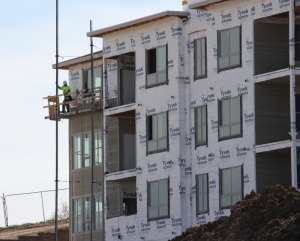What would you say about a program that uses taxpayer money to help low wage employers continue to pay low wages?
Denver’s Mayor Michael Hancock wants to spend $150 million to fund 6000 affordable housing units. That’s $25,000 per unit to help people that can’t afford housing in Denver. But who really benefits?

The City Council, The Denver Post, and just about everybody else assumes an affordable housing crisis in Denver. There are two reasons for this assumption. First, some people can’t afford housing. Fine. I can’t afford to live in New York where the average home costs $1.36 million. Denver is an alternative to New York, and there are alternatives to Denver.
Second, employers can’t find workers because housing in Denver is too expensive. Never mind that we spent billions of dollars to build rail so it isn’t necessary to live where you work.
What makes housing affordable? The ability to pay, which is largely dependent on income. If I have no income, housing costs as low as $10 per month is not affordable.
Government subsidies for affordable housing help keep wages low. If businesses do not pay enough to afford housing near work, employees have to find work where they can afford to live. When employees leave to take jobs elsewhere, businesses have two options: automate, or raise wages to attract workers. Now Hancock is offering a third option: use taxpayer money to pay for low wage housing. If automation is not possible or practical, Hancock’s scheme allows employers to keep paying paying lower wages.
![]() A study by the Institute for Research on Poverty (IRP) found that the federal government’s Section 8 program, which provides housing vouchers for low-income families, increased employment but decreased wages. It’s safe to assume Denver commissioned no such study for its own subsidized housing scheme.
A study by the Institute for Research on Poverty (IRP) found that the federal government’s Section 8 program, which provides housing vouchers for low-income families, increased employment but decreased wages. It’s safe to assume Denver commissioned no such study for its own subsidized housing scheme.
Of course, the “increased minimum wage crowd” believes they have the answer to that: make the businesses pay higher wages! Is there a limit to what we can make businesses pay? I’m sure they can find studies to show that forced higher wages do not affect employment. But how often do those studies survey businesses that were never created because government forced up the cost of labor?
A study by the Common Sense Policy Roundtable shows that the proposed minimum wage increase on Colorado’s ballot would cost 90,000 jobs by 2020. But if you don’t believe their study, take a look at Colorado writer Ari Armstrong’s common sense example. The people that lose their jobs won’t be able to afford “affordable” housing because their new minimum wage will go to zero dollars an hour.
How else does subsidized housing hurt? People in subsidized housing often receive other subsidies – Medicaid, SNAP (food stamps), earned income tax credits (federal and state), heating assistance, and the list goes on and on. If a person receiving those subsidies were to make more money, some of the subsidies go away. The loss of subsidies can cost more than the increased income, essentially a tax of over 100% on the new income. A person can become trapped, either working the same low-income job for fear of losing subsidies, or unable to move for fear of losing the “affordable housing”.

Owners of affordable housing units don’t participate in market increases. If they wish to sell their homes, the government establishes a maximum resale price. My research shows that in one area of Denver, homes that do not have government maximums on sale prices sold for about 40% more than government-priced affordable homes. That might keep housing affordable for the next buyer, but what was the benefit for the seller? While others are enjoying gains in the value of their homes, government tells the subsidized homeowner that they cannot.
This ill-conceived subsidy scheme allows low wage employers to continue paying low wages, and will hurt those that it is intended to help.
Brian Vande Krol is a director of the Colorado Republican Business Coalition, which advocates for small business, but not for subsidies. He ran for state representative in 2010 and 2012, and is a residential real estate appraiser.


